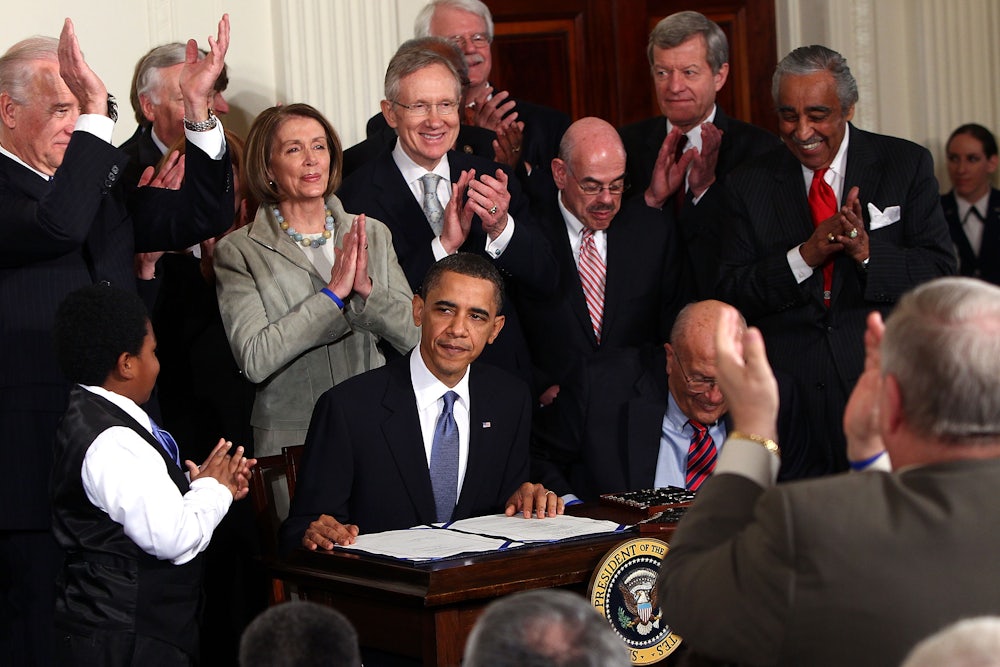In the first years of Barack Obama’s presidency, it often seemed as if he would never escape the shadow of his predecessor. Toiling under the weight of a world-historical recession, and saddled with two overseas wars, the Obama administration was torn between cleaning up the last administration’s mess and making its own mark. Obama was criticized constantly for forging ahead with health care reform and a plan to fight climate change while the country was still struggling to slough off the migrainous effects of the recession. (He won reelection in 2012 with an unemployment rate of nearly 8 percent.) By the end of his two terms, however, he had cobbled together a distinct legacy that, on the domestic side anyway, was producing results: millions of newly insured people; slowing growth for health care costs; rising wages; billions of dollars in reimbursements to victims of financial crimes; and an enforcement mechanism to curb greenhouse gas emissions.
It took the GOP less than a year to deliver that legacy a mortal blow.
As the Republican-controlled Congress prepares to send a $1.5 trillion tax reform bill to President Donald Trump, replete with a repeal of the Obamacare individual mandate, all the progress that Democrats painstakingly made over eight years is at risk of being rolled back. While the GOP has failed to repeal Obamacare in toto, leaving in place its system of subsidies and an expansion of Medicaid, the individual mandate is the lynchpin of the law, ensuring that enough healthy people are in the system to cover the costs for the sick and the elderly. Most economists agree that repealing the mandate would both increase the number of uninsured and drive up costs for everyone else, which in turn would affect the stability of the individual insurance market. Meanwhile, the vast majority of the bill’s tax cuts—83 percent, according to the Tax Policy Center—would go to the top 1 percent of earners, a brazen upward redistribution of wealth that would not only exacerbate income inequality, but would also likely fail to have much trickle-down effect on wages for everyday workers.
The Trump administration doesn’t need Congress’s help to smash Obama’s other initiatives. The Dodd-Frank Act, intended to prevent another financial crisis, remains intact, but Trump has undermined it in various ways, appointing banking insiders, starting with Treasury Secretary Steve Mnuchin, to oversee the industry. The Volcker Rule—originally meant to prevent banks from betting with their own money—is being rewritten. The Consumer Financial Protection Bureau, the sole agency tasked with protecting consumers from predatory lending practices, is now being led by Mick Mulvaney, director of the White House Office of Management and Budget, who once said, “I don’t like the fact that CFPB exists.” Under Scott Pruitt, the Environmental Protection Agency has pledged to abandon Obama’s Clean Power Plan and has rapidly transformed into a veritable arm of the fossil fuel industry, as my colleague Emily Atkin has reported over the past year.
How were Republicans able to dismantle so much so quickly? On a fundamental level, it’s much easier to take something apart than it is to build it in the first place. Democrats are devoted to developing governmental systems—many of which are necessarily complex—to expand health care or safeguard wages or curb Wall Street greed, while Republicans are devoted to paring that entire apparatus back. This represents an almost ontological difference between the two parties. But the accelerant comes from the Republican Party taking its libertarianism to a crude, nihilistic endpoint.
At the beginning of this year, there were reasons to hope that, despite controlling Congress and the White House, Republicans would fail to make much of a dent in Obama’s legacy. The human costs of repealing Obamacare, for example, are high and undeniable; the policy upsides, meanwhile, are virtually nil. The GOP, it was thought, still possessed some statesmen and stateswomen in the Senate who would put an end to this madness, who would let their conscience and common sense guide them, which is what appeared to happen over the summer, when John McCain, joined by Senators Susan Collins and Lisa Murkowski, dramatically voted down Mitch McConnell’s so-called “skinny repeal.” All three senators were treated to profiles-in-courage press coverage. And yet all three ended up supporting the tax reform bill, which contained the main plank of skinny repeal: the end of the individual mandate. (McCain did not actually vote because of medical issues, but his endorsement was a key moment for tax reform.) Time and again liberals placed their hopes in a rogue Republican—Bob Corker, anyone?—only to see them all cave.
At the very least it was thought that, even if Republicans had abandoned any pretense of being responsible stewards, they still had to obey the laws of electoral politics. If they stole from the poor to give to the rich, allowed pollution to fill the skies, and enabled banks to prey on consumers, voters would punish them at the polls. But the GOP is seemingly indifferent to this bedrock democratic incentive. With a poisonous president leading the party, whose main accomplishment is an almost comically villainous tax reform bill, the GOP is looking at a slaughter in the 2018 midterms and beyond. The Democrats’ recent victories in Virginia and Alabama point to an activated liberal base and a depressed conservative one, a formula for a Democratic wave. Republicans see the wave coming, and have apparently decided to take as much as they can before it hits.
And so we arrive at the Democratic Party’s last ember of hope, that they will sweep Republicans out of power and begin the hard task of rebuilding what has been torn down. But the last year has shown the Sisyphean nature of this work: eight years of labor, against so many obstacles, can all but vanish in a moment. It can vanish again, because the main threat to this country, to its prosperity and basic well-being, is one of its two major parties.
